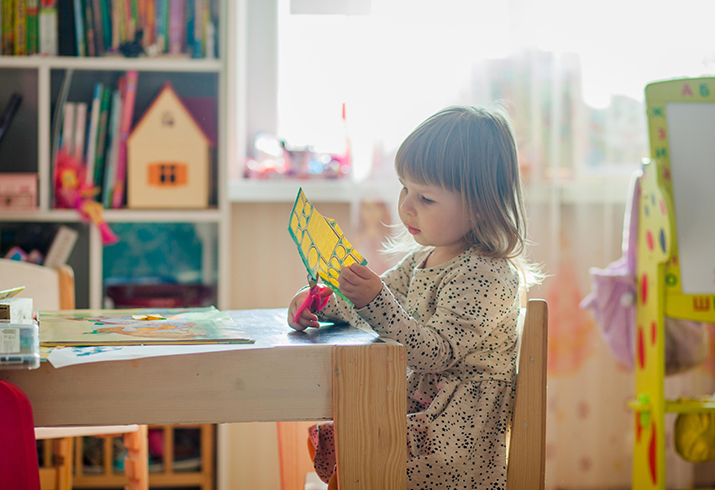Five steps for a safe and stress-free lockdown

Instead of returning to ‘normal routines’ and school this week, families and children throughout WA are today instead adapting to lockdown measures. While we can’t tell what the best and safest choices are for everyone’s unique situation and family, I’ve put together some tips for making the best out of this unanticipated situation – my five steps for a safe and stress-free lockdown.
Structure and routine
It may seem like your plans have gone out of the window but making what plans you can ahead of time will make the days themselves much less stressful. We need to try and maintain some structure during this period of change and readjustment. The more predictability we can create in this uncertain time, the better it is for kids, by making decisions early, you can really help them be prepared for what’s going to happen. If you wait until the last minute to figure out plans, kids won’t have time to deal with any confusion or disappointment, which will make this time that much more stressful for the whole family. Structure allows kids to devote mental resources and energy to maintaining self-control instead of expending mental energy processing the stimulation in their environment.
Staying active and entertained
Kids who are anxious or struggle with obsessive thinking don’t do well with down time. Kids prone to big emotions or obsessive thinking often cope by distracting themselves with schoolwork or activities that occupy their minds while filling lots of time. When the normal school routine ends, it’s not unusual for kids who dwell on their thoughts to become more emotional and stressed. We can help by keeping our kids occupied (with activities other than screen time) during this time. The one hour of allowed exercise time is an opportunity for kids to take a safe walk or scooter ride in their local neighbourhood.Strong connections with family and friends
As restrictions are placed on visits to other households, family members and close friends who don’t live with us can often seem like they are kilometres away during these times. It is really important that these connections and relationships are maintained to provide our kids with reassurance these people are still happy, healthy and will be reunited with us once restrictions are lifted. Although we can’t catch-up in person - utilising Zoom, FaceTime or even just a phone call can keep these connections going. As caregivers, we can make an activity of writing a card of letter to one of our loved ones, wishing them health and letting them know we are holding them in mind.
Space for big emotions
It’s very tempting to tell our kids that “it’ll be fine” when they’re upset about a cancelled event or something not turning out the way they want it to – like returning to school. But it’s important to also validate how they are feeling and hear them out. Taking the time to acknowledge that we also may be upset, and it’s okay for them to be upset. We can also teach our children how to cope with negative feelings in a positive way. We can explain and show them what we are doing to make ourselves feel better and help them finds their own ways to do the same. That validation can go a long way in calming those feelings, and it gives us a chance to talk and explain what’s going on. Keeping our kids in the conversation and letting them know that we hear them helps a great deal when we can’t always give them what they want or need.
Sleep, sleep, sleep (without the screens)
Sleep lets our young kids’ minds recharge and process information. It’s the only part of their day that their bodies get to rest and repair. Kids who regularly get an adequate amount of sleep have improved attention, behaviour, learning, memory, and overall mental and physical health. Lack of sleep causes irritability, increased stress, forgetfulness, and difficulties with learning and low motivation. Over time, it can contribute to anxiety and depression. Most of our children (depending on age) should be getting 9-12 hours of sleep every day. It is tempting to let our sleep habits fall off the list of important things during these uncertain times, but without enough sleep our kids may have problems with thinking, concentrating, memory, reaction times and mood.
To recap, small steps we can all take with our kids to help with all of our family’s mental health wellbeing include:
- Structure and routine maintain as much structure and routine as possible
- Staying active and entertained keep kids occupied
- Strong connections with family and friends making the most of technology to stay connected
- Space for big emotions young people are allowed to have big feelings and express them safely
- Sleep, sleep, sleep the importance of maintaining a young person’s sleep cannot be overstated.
About the author
Dr Alex Thompson is a Consultant Child and Adolescent Psychiatrist at CAMHS. He is the head of the CAMHS Emergency Telehealth Service (ETS), based at PCH and he assists on Ward 5A, the PCH mental health inpatient unit. He first came to CAMHS as part of his basic psychiatric training in 2013 and returned in 2015 as a senior registrar. His first consultant position in 2017 saw him working at Bentley Adolescent Unit - the CAHS authorised mental health unit operating prior to the opening of PCH.
About CAMHS ETS
For urgent mental health support you can contact the CAMHS Emergency Telehealth Service (ETS).
The CAMHS ETS provides phone and online videocall support for children and young people who are experiencing a mental health crisis, as well as support and advice to families and carers.
This service is available by calling 1800 048 636, between 8am and 2.30am, seven days a week and will be operating as normal over the holiday period.

